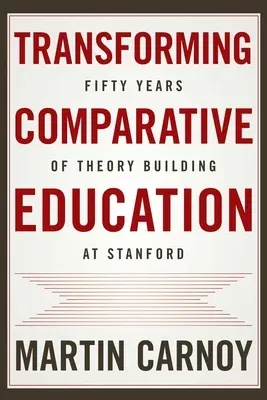Martin Carnoy
(Author)Transforming Comparative Education: Fifty Years of Theory Building at StanfordHardcover, 2 April 2019

Qty
1
Turbo
Ships in 2 - 3 days
In Stock
Free Delivery
Cash on Delivery
15 Days
Free Returns
Secure Checkout

Print Length
272 pages
Language
English
Publisher
Stanford University Press
Date Published
2 Apr 2019
ISBN-10
1503608425
ISBN-13
9781503608429
Description
Product Details
Author:
Book Format:
Hardcover
Country of Origin:
US
Date Published:
2 April 2019
Dimensions:
23.37 x
15.75 x
2.29 cm
ISBN-10:
1503608425
ISBN-13:
9781503608429
Language:
English
Pages:
272
Publisher:
Weight:
544.31 gm